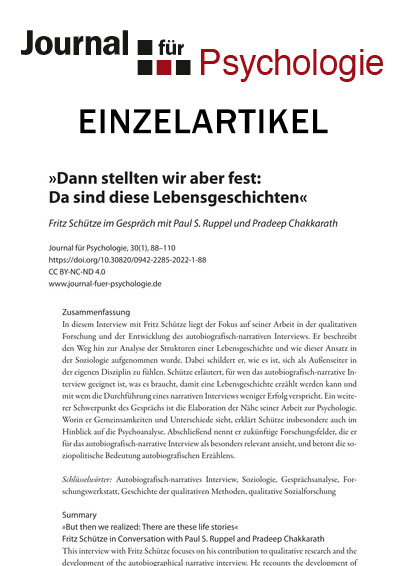»But then we realized: There are these life stories«
Fritz Schütze in Conversation with Paul S. Ruppel and Pradeep Chakkarath
DOI:
https://doi.org/10.30820/0942-2285-2022-1-88Keywords:
Autobiographical narrative interview, sociology, conversation analysis, research workshop, history of qualitative methods, qualitative social researchAbstract
This interview with Fritz Schütze focuses on his contribution to qualitative research and the development of the autobiographical narrative interview. He recounts the development of the method of analyzing the structures of a life story and its reception in the field of sociology. In doing so, he describes how it is to feel like an outsider in one’s own discipline. Schütze addresses for whom the autobiographical narrative interview is appropriate, what is required for a life story to be told, and with whom conducting a narrative interview is less likely to be successful. The interview also focuses on the closeness of his work to psychology, on the similarities and differences, especially regarding psychoanalysis. Finally, he specifies the future fields of research for which the autobiographical narrative interview will be particularly relevant and comments on the socio-political significance of autobiographical narrative.
Downloads
How to Cite
Schütze, Fritz, Paul S. Ruppel, and Pradeep Chakkarath. 2022. “»But Then We Realized: There Are These Life stories«: Fritz Schütze in Conversation With Paul S. Ruppel and Pradeep Chakkarath”. Journal für Psychologie 30 (1):88-110. https://doi.org/10.30820/0942-2285-2022-1-88.
Issue
Section
Artikel
License

This work is licensed under a Creative Commons Attribution-NonCommercial-NoDerivatives 4.0 International License.
This license allows private use and unmodified distribution, but prohibits editing and commercial use (further information can be found at: https://creativecommons.org/licenses/by-nc-nd/4.0/).
The terms of the Creative Commons licence only apply to the original material. The reuse of material from other sources (marked with a reference) such as charts, illustrations, photos and text extracts may require further permission for use from the respective copyrights holder.


